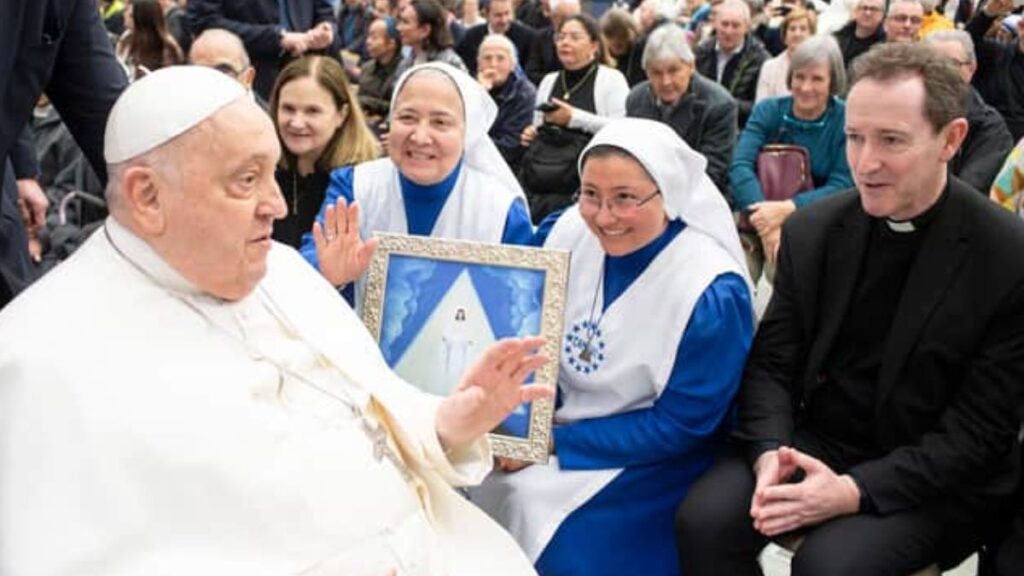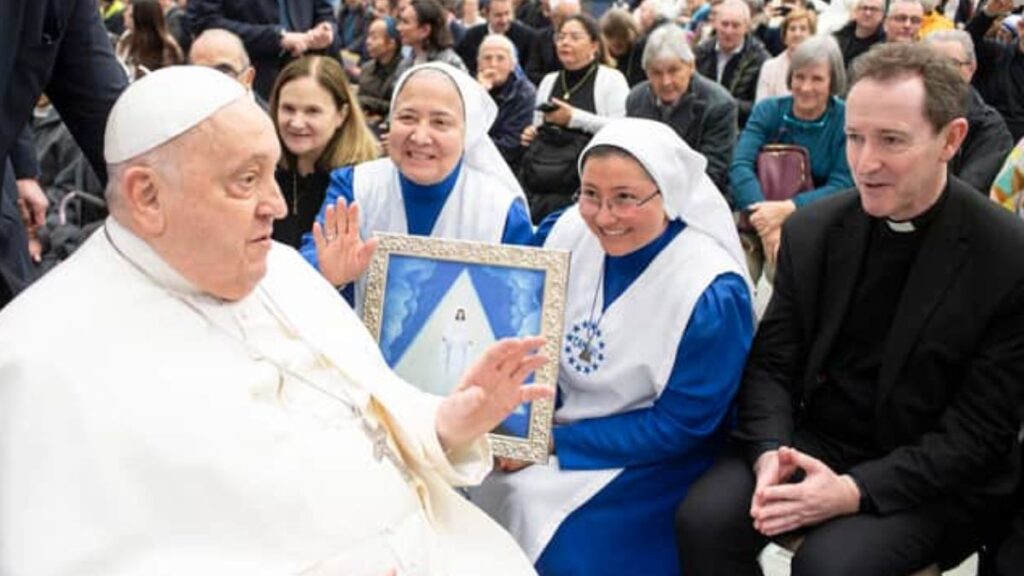Father Gerard Maguiness, who met Pope Francis in February, writes in The Scotsman about what the first Jesuit to be Supreme Pontiff meant to him. Father Maguiness is the general secretary of the Bishops' Conference of Scotland and a priest of the Diocese of Motherwell.
***
It was with great sadness but not surprise that I heard the news of the passing of Pope Francis on this Easter Monday morning.
I was blessed to meet Pope Francis at his last general audience on February 12, just two days before he was admitted to hospital – he was a very ill man (see title image).
These past few weeks struggling with illness and the frailty of old age summarised the determination and commitment of Pope Francis; even yesterday on the balcony of St Peter's Basilica, Pope Francis made an appearance to bless the city and the world, urbe et orbe.

Despite the burden of his illness weighing on him, he wanted to bless our broken world and invite all of us to pray for peace and healing.
In a world characterised by polarisation and conflict, Pope Francis was a unifying figure who reached out to all Catholics, all Christians, to the Jewish people, to Muslims, and all the major world religions.
None should be excluded
He was a great believer that nobody is excluded from the loving mercy of Jesus Christ and this extended to those who don't have an explicit belief in God and those distant from the Church because of the failings of members of the Church.
Where did this vision of Pope Francis have its roots? Pope Francis was the first Jesuit Pope. The Company of Jesus or Jesuits were formed by St Ignatius of Loyola in the 16th century to reach out to a world that was changing rapidly due to the Reformation.
The motto of the Jesuits is ad maiorem Dei gloriam, meaning for the greater glory of God. Pope Francis endeavoured to make the glory of God present in our world, a glory that is revealed by the love of Christ crucified on the cross.
From a crucifix, Jesus spoke to the young Saint Francis and told him to rebuild His church in the 13th century. Undoubtedly Pope Francis, in choosing this name, saw his role to rebuild the Church in our time, especially given the crisis of faith caused by abuse.
His response to the challenges facing the Church and also our world was not despondent. The first letter published by Pope Francis was The Joy of the Gospel. Our world needs the Good News of the Gospel, it needs joy, it needs light in the darkness, it needs healing and a way to look forward.
Almost in exile during Argentina’s dictatorship
As the Jesuit priest Jorge Bergoglio, Pope Francis experienced personal difficulties during the dictatorship in Argentina. He found himself almost exiled to Germany to study theology. Fortunately in that difficult period, Pope Francis also discovered a prayer, a devotion to Mary, the mother of Jesus, known as ‘Our Lady, untier of knots’.
He was able to untie the knots of his ministry and see that life is never so desperate that the loving mercy of Jesus Christ cannot overcome the problems that we cause through our human failures. He would go on in the Joy of the Gospel to describe the Church and the world as a field hospital.
Human beings are wounded and hurting and the role of a follower of Jesus is to bring healing, not condemnation. He warned the clergy that they are not guardians of the grace of God but channels of God’s grace and forgiveness.
Joint trip with Kirk Moderator
Pope Francis would develop this openness to others through his pastoral visits to countries with small Catholic communities, such as Iraq and Mongolia, and also through his letter Fratelli Tutti – we are all brothers and sisters.
Furthermore, Pope Francis realised that – as well as the need for Christians to work together, expressed particularly for us through his joint trip with the Moderator of the Church of Scotland and the Archbishop of Canterbury to South Sudan, and the desire for dialogue with others of all faiths and none – our planet, our common home needs all men and women of good will to work together, as summed up in his letter, Laudato si’.
Pope Francis will be remembered as the Pope who loved our world, who loved people especially the young, the elderly, the frail and the wounded. He would not allow anyone to limit the love of God revealed in Jesus Christ.
A shepherd with the smell of the sheep, who reminded his flock not to be miserable but to be merciful, to be joyful and to always look for the way forward when we are lost.
